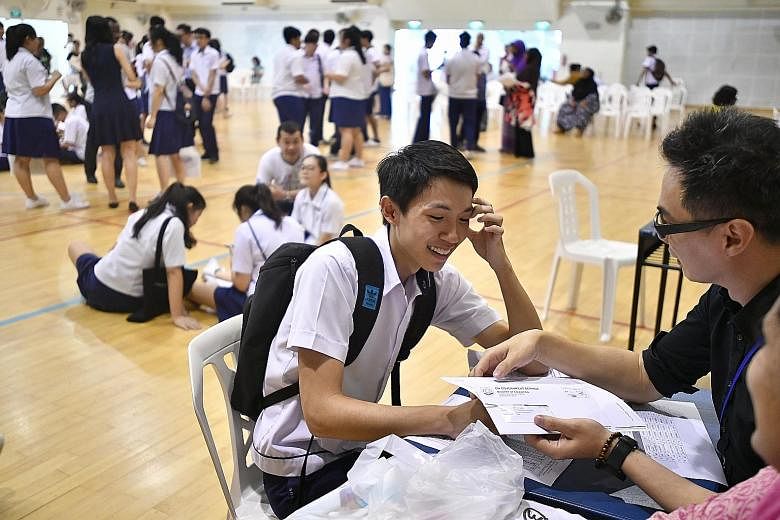In time to come, students could take more examinations on digital devices instead of writing essays by hand, said Education Minister Ong Ye Kung.
His ministry has received positive feedback from students on computer-based writing examinations that were introduced as a pilot in a few subjects, such as mother tongue and literature, he said in Parliament yesterday.
"Students can more readily cut and paste, edit their essays, move paragraphs around. They can be asked to respond to an e-mail, write a blog or social media post, which better reflects real-life situations that students will go through later in life," he said.
But such electronic exams are still some distance away, he added.
"We need to take into account the readiness of schools and students... We should not inadvertently disadvantage students who may not be exposed to computers as much as others."
Mr Ong was responding to five MPs who had asked whether the ministry had plans to introduce electronic exams or marking, and whether it was possible for all GCE exam papers to be marked locally to minimise the risk of scripts being lost in transit.
Last month, the ministry disclosed that 32 O-level Additional Mathematics Paper 2 scripts were lost on a train in Britain.
In 2017, a parcel with A-level Chemistry answer scripts from 238 Singapore students was stolen from a locked courier van en route to an examiner in Britain.
Mr Ong said that while his ministry and the Singapore Examinations and Assessment Board decide on the standards and grades for national exams, Cambridge Assessment is engaged to develop and mark the GCE N-, O-and A-level exams because of its strong expertise and experience.
"This arrangement has worked well over the years," he said, adding that Cambridge Assessment uses about 2,200 professors and experienced educators from universities and higher institutions to mark the scripts.
Each year, about 1.1 million answer scripts are generated from the GCE-level examinations, with 800,000 of them marked by Cambridge Assessment. The rest - comprising Mother Tongue language, Social Studies and Coursework components - are marked locally.
Mr Ong noted that marking all the scripts locally would require "a very substantial amount of highly qualified resources".
"We need to be mindful too about the workload and well-being of our teachers," he said, as marking would take place during the school vacation period, and there is a tight timeline between the exams and the release of results.
Nominated MP Walter Theseira asked if the ministry could study the cost of arranging for local marking.
"There should be no question internationally about the credibility of our examination system if it were to be done locally. Singapore has established a good reputation in that regard, and I am confident... there should be no issue with our students and our credentials," he said.
Replying, Mr Ong said that by the end of this year, marking for all GCE exams would be shifted online so there should be less concern about losing scripts.
"I fully agree with the Member that (in terms of) Singapore's reputation in education... we are at a good position to do this ourselves, and harness the resources, to mark the papers, set the questions," added Mr Ong.
"But we are where we are too because of a certain earnestness to learn from different systems around the world and to work with different credible, reputable systems around the world.
"Cambridge helped us, raised us to this level of international reputation, so it is a collaboration that is still worthwhile keeping, while mitigating the risk of lost scripts."


